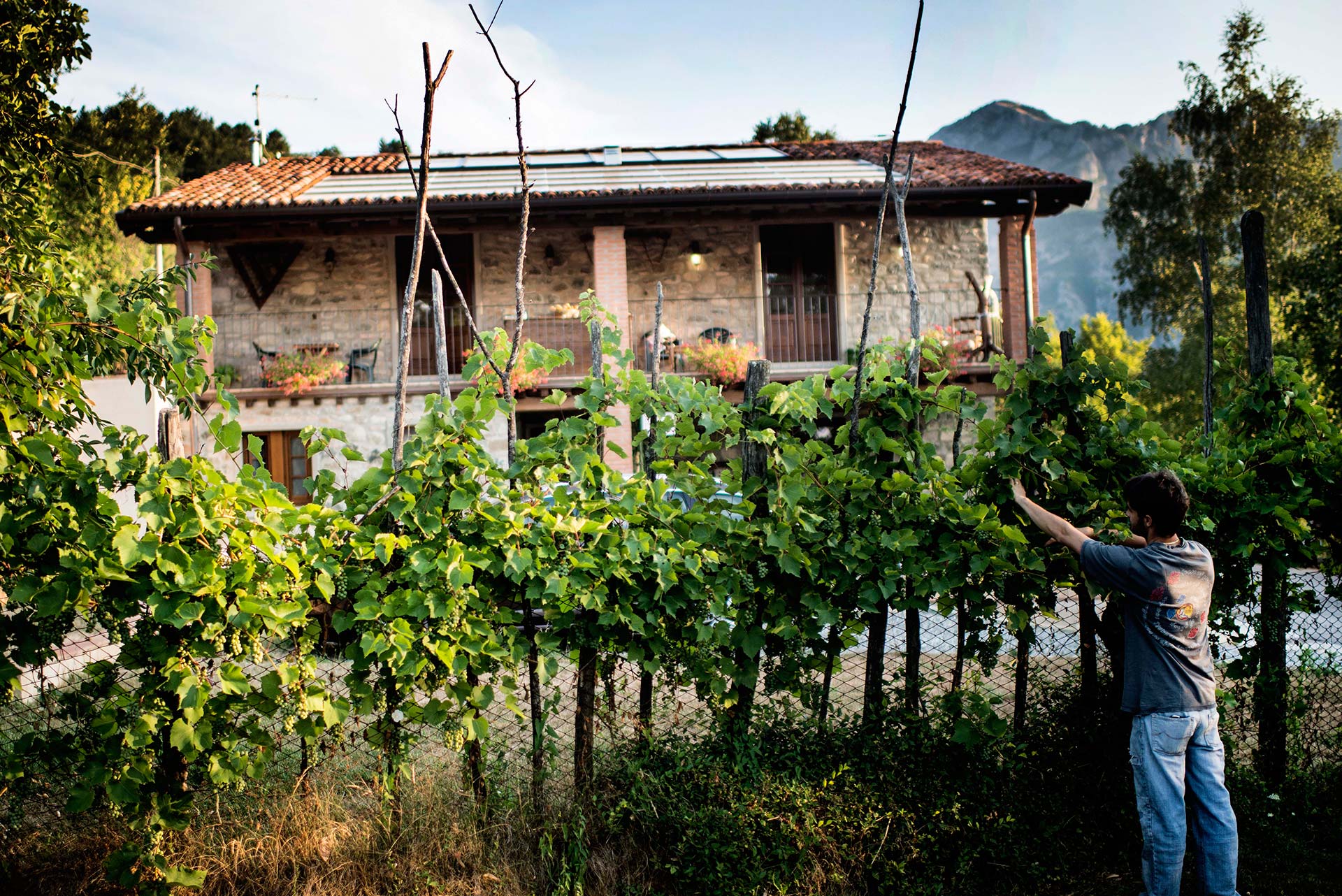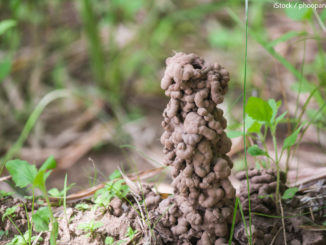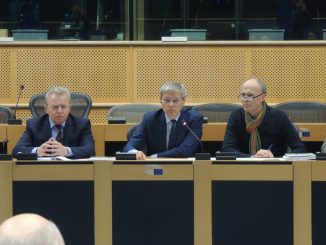Authors: Matteo Metta and Giampiero Mazzocchi (UNIPI) of the DESIRA Horizon2020 project.
Digital tools that suit the complexity of diversified farms and meet their specific needs can bring new challenges. Once these are overcome, however, they can contribute to farm resilience and viability. Meet two Italian farm enterprises and see how their stories and narratives show that digitalisation means not only access to connectivity, but also capacity to use, manage and control technologies.
In a focus group meeting organised by the University of Pisa within the Summer School of the International Master of Science in Rural Development, Laura Martinelli and Franca Bernardi talked about their experience with digitalisation and COVID-19 in their agritourism farms located in Garfagnana (Tuscany, Italy).
Starting from the farmers and their custodian role
Laura Martinelli is the owner of the agritourism La grotta della Faina. In 2014, together with her husband, she received support from the Rural Development Programme (RDP) for new entrants in agriculture and, since then, they have managed agritourism activities, beehives, hens and other fruit and vegetable production. Franca Bernardi is the owner of the agritourism Il Corniolo, who is a ‘digital native’. Before managing her agritourism farm, she gained long-lasting experience in the IT sector.
Both their farms are based on a strong sense of territorial development and community engagement, for which they are part of a well-established network in the Garfagnana area, the Agri-biodiversity and food community. Within this network, they became ‘custodian farmers’, which is an official commitment towards the territory and the community to recover, protect, and valorise food and agricultural biodiversity.
The digital components of their agritourism farms
For many years, these agritourism farms have relied mainly on their own websites to promote and manage the marketing of their services, including managing bookings. In one instance, the farm owner relied on external agents, specialised in information and communication technologies (ICT), to build and manage their websites.
With the emergence of online platforms such as Booking.com or Airbnb, Laura and Franca took more control over their digital interface with clients and extended the number of booking channels to manage and reach out to further potential clients.
Similarly, they learned to work with the online application foodbarrio.com to promote and directly market their food products. This app is easy to run and suitable for small-scale farmers. Its main strength lies on its ability to tell a story behind farmers’ products. Especially during the restrictions caused by the pandemic, “this app helped to maintain [virtual] relationships with the local community”’, they argued.
Challenges with the digital: logistics and websites management
E-commerce and websites are quite established digital solutions in the agritourism sector. Nevertheless, farmers always meet the same or new challenges with the evolution of digitalisation.
“With the multiplication and involvement in more communication channels, we run into higher risks of overbooking ( i.e. the mismatching between bed demand and supply)”.
Franca Bernardi, owner of agritourim Il Corniolo
One of the biggest challenges is to synchronise multiple platforms and coordinate them with their own calendar and websites, a problem that affects similarly other farmers in the area. The coordination and synchronisation of many booking sites is not an obvious task and requires advanced skills for management software of multiple online booking services.
They argue that apps and websites offer good solutions to promote and communicate with consumers about their farming life and food products. However, the virtual dimension of the farm also entails the hardware (physical) management. “The physical delivery of goods to the final consumer is another large area of work for us”, argued Laura Martinelli. She notes that farming entails many different activities, and sometimes the packaging and logistics aspects are just another extra burden. Both farmers have an agreement with the Italian Postal Service to ensure an express delivery of their orders within 24/48 hours (in Italy). However, Laura warns that the lack of a specialised delivery channel for food products can endanger their final quality and integrity.
Considering past damage of fragile products (e.g. jars, fruits, bottles), both farmers agreed that creating a special delivery channel would be a good idea, by delegating the packaging and shipping activities to one single intermediator who can collect the orders from multiple farmers and deliver them to the various consumers. From their perspective, this re-setting of the supply chain, with a logistics intermediator, would save farmers time, avoiding negative implications on the relationship with clients and value capture.
The benefits and opportunities
During the first phase of the COVID-19 lockdown, farmers experienced enormous problems in selling their food. In the first phase of the lockdown, both farmers relied on the civil protection and public institutions’ support to deliver food to families. In the second phase, they used the FoodBarrio app to manage their marketing, but also to share ideas, stories, problems and solutions with peer-farmers and consumers.
“Through virtual rooms and online communication channels, we were able to exchange and interact with our food community in Garfagnana, who had been obliged to get food only through the classic supermarkets”
Laura Martinelli, owner of agritourism La Grotta della Faina
Besides building up of a sense of community around food, Laura explained that “Foodbarrio created new business channels and a storytelling option helped us to present our products in a different way. Through digitalisation, we would like to increase our visibility and, possibly, reach out to our previous customers living abroad, who encountered, observed, tasted, smelled, and touched our farm experience and still have an appetite for our products.”
Integrating online and offline farm activities
Websites are the main platforms to order and deliver food products. However, both farmers combine digital with traditional strategies to find synergies among their diversified activities.
“Farm stays or field visits allow our guests to get their hands on our undertakings, to taste our products, and create a link between online or offline”
Laura Martinelli, owner of agritourism La Grotta della Faina
Direct contact points, such as open-air food markets or food festivals, are still meaningful practices to establish or maintain relationships with consumers. Franca Bernardi attends numerous physical food markets to explain and present her products in person. Physical encounters are not obsolete, even if their diversified farms operate in a digital market.
In stressing the importance of off-line and farm immersions, Franca mentioned two of her last ventures, which might have positive implications for the online activities: in one of them, she worked in the field with sight-challenged people to teach them to recognise the wide range of qualities and varieties of the apples produced in the Garfagnana area. In a second venture, the Erbi Boni project, she is collaborating with other farms and the University of Pisa to valorise wild herbs, e.g. by comparing wild species with farmed ones.
The cooperation and territorial dimension of digitalisation
Behind each digital solution, there is a wealth of cooperation. This was the case when public authorities and civil society organisations supported the physical delivery of food during COVID-19 or acted as ‘loudspeakers’ to raise awareness and promote the online purchasing of local food.
The food community in the Garfagnana area also used the FoodBarrio app to sell panieri (collective food baskets of selected traditional products). To save transaction costs (e.g. registration), farmers collectively created and used a single account with the Italian Postal Service to deliver food through this marketing channel, in addition to their own direct selling.
By being part of the food community in the Garfagnana area, multiple farmers can join the online selling of typical products, thus protecting the territorial identity and traditions, as well as promoting a territorial brand. Laura believes that digital solutions should be based on a territorial approach and foster cooperation among actors who can mutually benefit in different ways: e.g. higher visibility of farmers’ products, or better synergies between agriculture and other services/events in the area.
Both farmers concluded that the COVID-19 pandemic showed how internet and online platforms are important tools to enable communication and mediate collective learning, such as discussing similar challenges farmers face, and involving consumers and public institutions in finding solutions. While the learning and communication functions of digitalisation can be considered as the subtlest and trivial, both farmers believed that these have been and will continue to be very relevant in the future.
Reflections and thoughts about digitalisation in agritourism
This focus group meeting highlighted some of the challenges and opportunities of digitalisation in the context of agritourism farms and the COVID-19 pandemic. To understand some of the key lessons learned about the relationship between digitalisation and agritourism, it is important that future digitalisation policies and practices pay attention to:
- economy of scale: finding solutions to reduce transaction costs in the physical delivery of food or managing of bookings and other services; buying software collectively.
- economy of scope: creating virtual and offline synergies between multiple diversification activities in agriculture.
- the territorial approach: designing digital solutions by including multiple actors with a view of integrating agriculture with the local resources, society and economy.
- learning and communication: both in terms of upgrading digital skills and knowledge, as well as creating spaces and tools to facilitate interactions and sharing of cross-cutting information, organise trainings for farmers’ associations on the use of digital tools.
As witnessed by these two farmers during the current health and economic crisis, digital tools that suit the complexity of diversified farms and meet their specific needs, can bring new challenges but, once these are overcome, they can contribute to farm resilience and viability. Their stories and narratives show that digitalisation means not only access to connectivity, but also capacity to use, manage and control technologies. Digitalisation must be tailored to specific needs so as to avoid becoming an objective per se, rather than a mean for achieving specific goals.
This article first appeared on the DESIRA Horizon2020 project website. DESIRA (Digitisation: Economic and Social Impacts in Rural Areas) is a Horizon 2020 project (2019-2023) coordinated by the University of Pisa which involves 25 partner organisations (research institutes, NGOs and SMEs) in a multi-actor and inter-disciplinary Consortium. The project aims to improve the capacity of society and political bodies to respond to the challenges that digitalisation generates in agriculture, forestry and rural areas. You can read more about it here. On 10 September 2020, is organising the first online Rural Digitalisation Forum meeting (online). Express your interest by filling in this form.
More farm stories
Ireland
Letter from a Farm | Saving Carrottop – the Life of a Cow in Mayo
Letter from a Farm | Starting the Soil Health Journey in Ireland
A Message to CAP Bureaucrats & Vested Interests from a Man in Muddy Boots
Romania
Letter From The Farm | The Resilience and Privilege of a Rural Homestead
Italy
Letter from a Farm – Ruminating on the First Two Years in Italy
Letter From The Farm | What worked from the 1st growing season?
Czech
Letter From The Farm | A Conscientious Objector to the Meat Industry
Trouble With The Neighbours: Living Next Door to an Agri-Giant
Greece
Letter from the Farm | Spring Update from Greece’s Mazi Farm
Letter From The Farm | Mimicking Natural Processes in Greece







